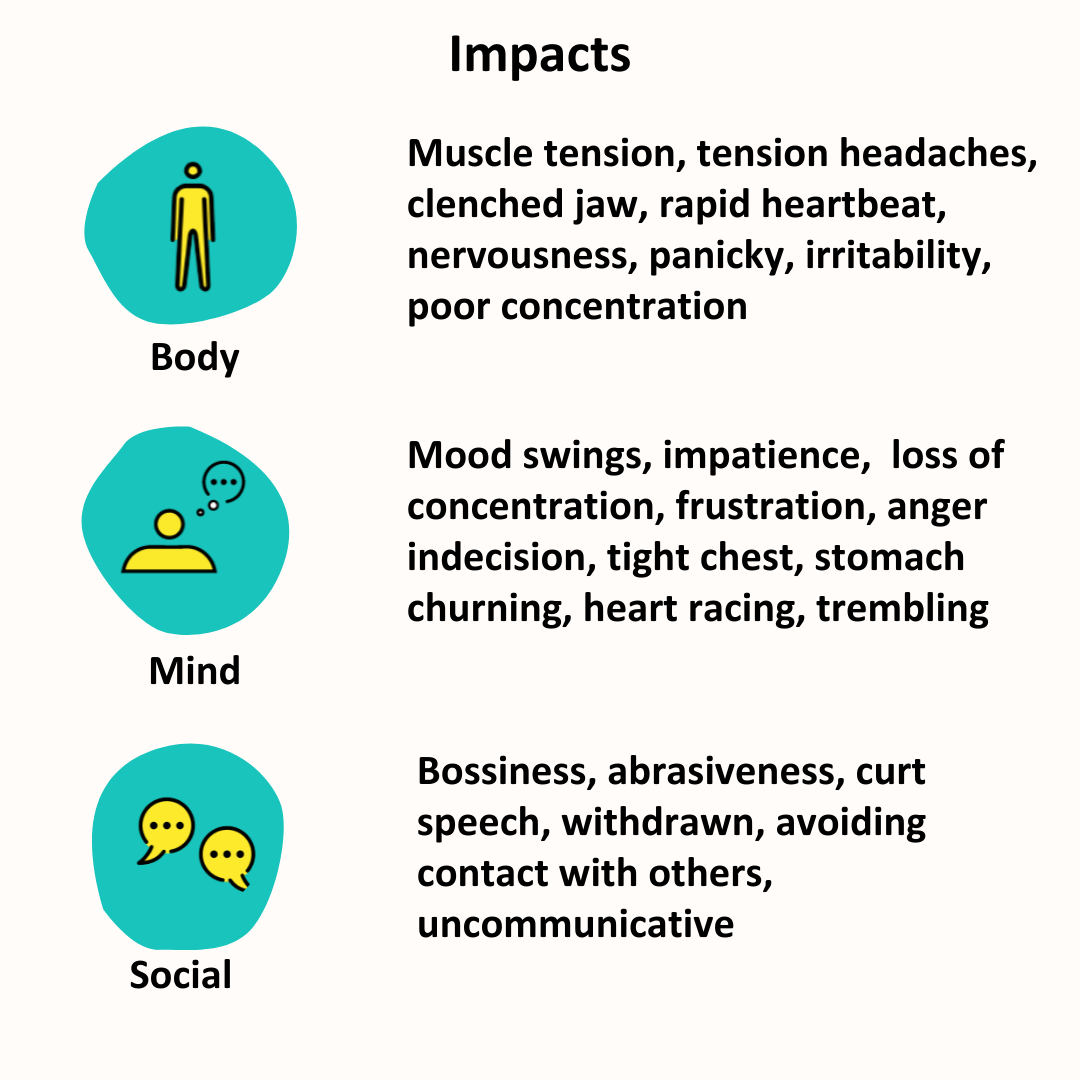Mental health covers a range of topics associated to managing stress and coping with anxiety. Stress is what happens to our bodies when situational demands exceed our perceived ability to cope. Anxiety is a typical response when normal concerns or uncertainty cause us without real evidence to worry excessively about things that might happen. Managing both stress and anxiety to an acceptable level is an essential element of your personal wellbeing.
Download the "Coping with COVID Guide" at the bottom of the page.

Rating and Self-Assessment

If you ranked your coping as GOOD then this section should help you maintain that. If you rated it as FAIR or POOR then this section should help you improve the situation.
Impacts
There is no typical acceptable level of stress or anxiety for an adult. They are an individual response: what you find stressful someone else might not.
Failing to manage your anxiety and stress levels can potentially have negative impacts on you in the short term.

If you, or one of the people you are close to, notice any of these signs you may be suffering from stress or unhelpful anxiety.
What You Can Do
There are simple actions you can take that typically, if used regularly, can help improve your stress response.
-
Learn and use controlled breathing techniques when feeling stressed or anxious. Breathe into your abdomen for 3 seconds through your nose, hold for two seconds, breathe out from your mouth for 2 seconds: repeat 3 to 5 times as you feel able. Concentrate on your breath going in and out as you breathe.
-
Maintain good social networks and focus on positive topics.
-
Engage in a personally relaxing activity that you enjoy on a regular basis. Yoga, Meditation and Mindfulness are very helpful in mitigating stress and can be studied online. (See Section on Physical Activity for suggestions of suitable actions.)
-
Ensure you get some physical activity during the day.
-
Write down what is stressing you, and the evidence for it, to evaluate its validity.
-
Identify typical situations where you notice being stressed and try to see them another way.
-
Challenge unhelpful thoughts by looking for the evidence for them. Unhelpful thoughts typically are absolutes (should, must, totally useless), mind-reading (I got no tea – I must be in trouble), or assuming the worst outcome (what if XX becomes a definite problem not a possible?). When faced with this kind of unhelpful thinking you should ask yourself ‘is that necessarily true or is there an alternative explanation?’
Additional Information
You might also find this additional information helpful.
- Write down a short list of some things that make you feel anxious and that you are aware you avoid. Rank them in order of their difficulty and then score them from 1 to 10 in terms of the challenge they pose you. Starting with the one you give your lowest score to try to face that situation and deal with it. Repeat until you are more comfortable with it and then move on to the next lowest item. Remember that the signs of anxiety are only true if you give in to them. If the anxiety does not reduce, initially try talking with a partner or trusted friend.
Here are some additional resources for you as an individual:
- Campaign Against Living Miserably (CALM).
- Mind - Mental Health Charity.
- UK NHS information site.
- World Health Organisation - Advice for individuals.
Here are some additional resources for organisations:
-
European Network for Wellbeing at Work: Industry and Organisational use.
-
European Network organisation for Mental Health organisations. Industry and Organisational use - multiple languages available.
-
WHO overview: Organisational use.
-
EU overview: Organisation use.
-
UK overview and resources: Organisation use.
-
UK MH Charity: Individual and Organisational use.
-
US Govt overview: Organisational use.
-
UK stress management at work standard. English language, Organisational focus
-
Canadian psychological health at work standard. English language, Organisational focus.
-
Canadian Government. Psychological hrealth in the workplace. English language. Organisational and indiviudual focus.
I consider this Topic to be better discussed in GA, as it concerns pilots behaviour.
Please log in or sign up to comment.